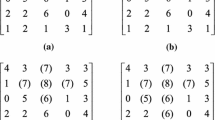Abstract
In this article relevant developments in relevance feedback based image annotation and retrieval are reported. A new approach to infer semantic concepts representing meaningful objects in images is also described. The proposed technique combines user relevance feedback and underlying low-level properties of elementary building blocks making up semantic objects in images. Images are regarded as mosaics made of small building blocks featuring good representations of colour, texture and edgeness. The approach is based on accurate classification of these building blocks. Once this has been achieved, a signature for the object of concern is built. It is expected that this signature features a high discrimination power and consequently it becomes very suitable to find other images containing the same semantic object. The model combines fuzzy clustering and relevance feedback in the training stage, and uses fuzzy support vector machines in the generalization stage.
Preview
Unable to display preview. Download preview PDF.
Similar content being viewed by others
References
O’Reilly, J.: Content Engineering. Electronics Communications Engineering Journal 14(4) (August 2002)
Vailaya, A., Figueiredo, M.A.T., Jain, A.K., Zhang, H.-J.: Image classification for content-based indexing. IEEE Trans. Image Processing 10, 117–130 (2001)
Vailaya, A., Jain, A., Zhang, H.-J.: On image classification: city vs. landscape. In: Proc. IEEE Workshop on Content-Based Access of Image and Video Libraries, pp. 3–8 (1998)
Dorai, C., Venkatesh, S.: Bridging the semantic gap with computational media aesthetics. IEEE Multimedia 10, 15–17 (2003)
Cox, J., Miller, M., Minka, T., Yianilos, P.: An Optimized Interaction Strategy for Bayesian Relevance Feedback. In: IEEE International Conference on Computer Vision and Pattern Recognition, pp. 553–558 (1998)
Rui, Y., Huang, T.S., Ortega, M., Mehrotra, S.: Relevance Feedback: A Power Tool in Interactive Content-Based Image Retrieval. IEEE Tran. Circuits and Systems for Video Technology 8(5), 644–655 (1998)
Jing, F., Li, M., Zhang, H.-J., Zhang, B.: Relevance Feedback in Region-Based Image Retrieval. IEEE Transactions on Circuits and Systems for Video Technology 14(5) (2004)
Rui, Y., Huan, T.S., Mehrotra., S.: Content-based Image Retrieval with Relevance Feedback in MARS. In: Proceedings of IEEE Int. Conf. on Image Processing, pp. 26–29 (1997)
Koskela, M., Laaksonen, J., Oja, E.: Use of image Subsets in Image Retrieval with Self-Organizing Maps. In: Enser, P.G.B., Kompatsiaris, Y., O’Connor, N.E., Smeaton, A.F., Smeulders, A.W.M. (eds.) CIVR 2004. LNCS, vol. 3115, pp. 508–516. Springer, Heidelberg (2004)
Wu, K., Yap, K.H.: Fuzzy relevance feedback in content-based image retrieval. In: Proc. Int. Conf. Information and Signal Processing and Pacific-Rim Conf. Multimedia, Singpore (2003)
Tian, Q., Wu, Y., Huang, T.S.: Incorporate Discriminate Analysis with EM Algorithm in Image Retrieval. In: Proc. IEEE International Conf. on Multimedia and Expo. (2000)
Wu, Y., Tian, Q., Huang, T.S.: Integrating Unlabeled Images for Image Retrieval Based on Relevance Feedback. In: Proc. of the 15th Int’l Conf. on Pattern Recognition, vol. 1, pp. 21–24 (2000)
Müller, K.-R., Mika, S., Ratsch, G., Tsuda, K., Schölkopf, B.: An introduction to kernel-based learning algorithms. IEEE Neural Networks 12(2), 181–201 (2001)
Vapnik, V.: The Nature of Statistical Learning Theory. Springer, New York (1999)
Vapnik, V.: An overview of statistical learning theory. IEEE transactions on Neural Networks 5, 988–1000 (1999)
Lin, C.-F., Wang, S.-D.: Fuzzy Support Vector Machines. IEEE Transactions on Neural Networks 13(2), 464–471 (2002)
Wu, X., Srihari, R.: Incorporating prior knowledge with weighted margin support vector machines. In: Proceedings of the international conference on Knowledge discovery and data mining, pp. 326–333 (2004) ISBN:1-58113-888-9
Dorado, A., Djordjevic, D., Pedrycz, W., Izquierdo, E.: Efficient image selection for concept learning. In: IEE Proceedings Vision, Image & Signal Processing (to appear, 2005)
Author information
Authors and Affiliations
Editor information
Editors and Affiliations
Rights and permissions
Copyright information
© 2006 Springer-Verlag Berlin Heidelberg
About this paper
Cite this paper
Izquierdo, E., Djordjevic, D. (2006). Using Relevance Feedback to Bridge the Semantic Gap. In: Detyniecki, M., Jose, J.M., Nürnberger, A., van Rijsbergen, C.J. (eds) Adaptive Multimedia Retrieval: User, Context, and Feedback. AMR 2005. Lecture Notes in Computer Science, vol 3877. Springer, Berlin, Heidelberg. https://doi.org/10.1007/11670834_2
Download citation
DOI: https://doi.org/10.1007/11670834_2
Publisher Name: Springer, Berlin, Heidelberg
Print ISBN: 978-3-540-32174-3
Online ISBN: 978-3-540-32175-0
eBook Packages: Computer ScienceComputer Science (R0)




